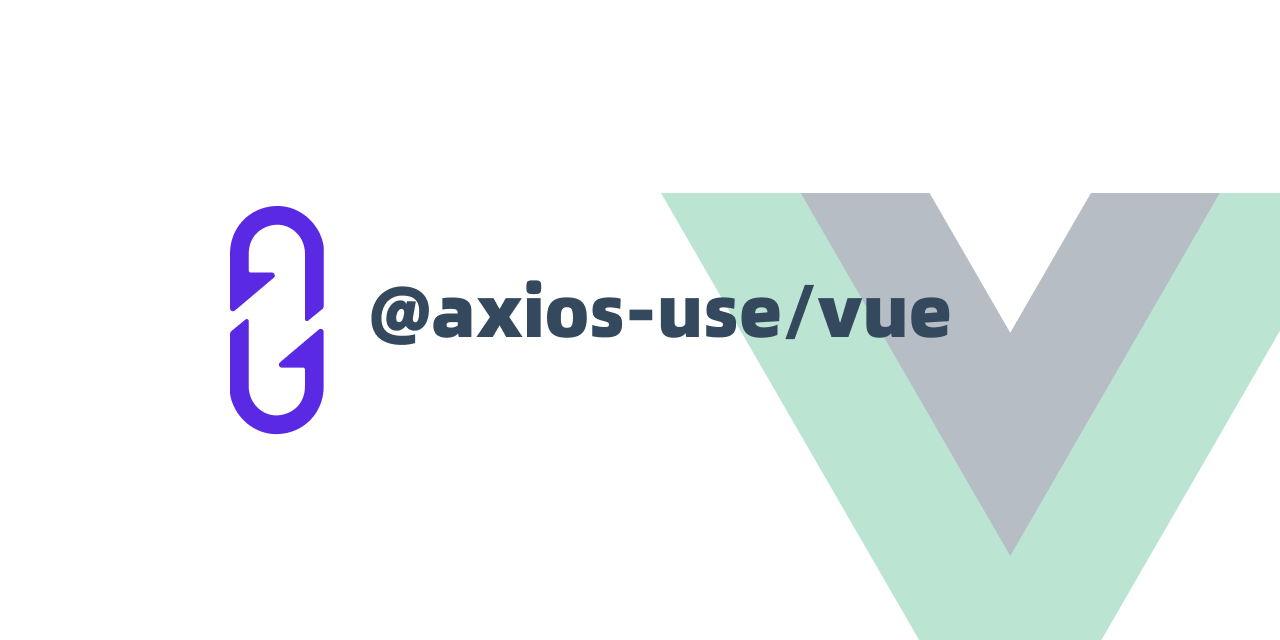
Usage
Install
npm i axios @axios-use/vueQuick Start
<script setup>import { defineProps, toRef } from "vue";import { useResource } from "@axios-use/vue";const props = defineProps(["userId"]);const userId = toRef(props, "userId");const [reqState] = useResource((id) => ({ url: `/user/${id}` }), [userId]);</script><template> <div v-if="reqState.error">{{ reqState.error?.message || "error" }}</div> <div v-else-if="reqState.isLoading === false">{{ reqState.data?.name }}</div> <div v-else>...</div></template>import { useRequest, useResource } from "@axios-use/vue";Options (optional)
| config | type | default | explain |
|---|---|---|---|
| instance | object | axios | Axios instance. You can pass your axios with a custom config. |
| getResponseItem | function | (r) => r.data | custom data value. The default value is response'data'. PR#1 |
import axios from "axios";import AxiosUseVue from "@axios-use/vue";import App from "./App.vue";// custom Axios instance. https://github.com/axios/axios#creating-an-instanceconst axiosInstance = axios.create({ baseURL: "https://example.com/",});const app = createApp(App);// custom instanceapp.use(AxiosUseVue, { instance: axiosInstance });app.mount("#app");// Vue.js v2.7Vue.use(AxiosUseVue, { instance: axiosInstance });useRequest
| option | type | explain |
|---|---|---|
| fn | function | get AxiosRequestConfig function |
| options.onCompleted | function | This function is passed the query's result data. |
| options.onError | function | This function is passed an RequestError object |
| options.instance | AxiosInstance | Customize the Axios instance of the current item |
| options.getResponseItem | function | custom returns the value of data(index 0). |
// jsconst [createRequest, { hasPending, cancel }] = useRequest((id) => ({ url: `/user/${id}`, method: "DELETE",}));// tsconst [createRequest, { hasPending, cancel }] = useRequest((id: string) => // response.data: Result. AxiosResponse<Result> request<Result>({ url: `/user/${id}`, method: "DELETE", }));interface CreateRequest { // Promise function ready: () => Promise<[Payload<T>, AxiosResponse]>; // Axios Canceler. clear current request. cancel: Canceler;}type HasPending = ComputedRef<boolean>;// Axios Canceler. clear all pending requests(CancelTokenSource).type Cancel = Canceler;// options: onCompleted, onErrorconst [createRequest, { hasPending, cancel }] = useRequest( (id) => ({ url: `/user/${id}`, method: "DELETE", }), { onCompleted: (data, response) => console.info(data, response), onError: (err) => console.info(err), });useResource
| option | type | explain |
|---|---|---|
| fn | function | get AxiosRequestConfig function |
| parameters | array | false | fn function parameters. effect dependency list |
| options.filter | function | Request filter. if return a falsy value, will not start the request |
| options.defaultState | object | Initialize the state value. {data, response, error, isLoading} |
| options.onCompleted | function | This function is passed the query's result data. |
| options.onError | function | This function is passed an RequestError object |
| options.instance | AxiosInstance | Customize the Axios instance of the current item |
| options.getResponseItem | function | custom returns the value of data(index 0). |
// jsconst [reqState, fetch, refresh, cancel] = useResource((id) => ({ url: `/user/${id}`, method: "GET",}));// tsconst [reqState, fetch, refresh] = useResource((id: string) => // response.data: Result. AxiosResponse<Result> request<Result>({ url: `/user/${id}`, method: "GET", }));type ReqState = ComputedRef<{ // Result data?: Payload<T>; // axios response response?: AxiosResponse; // normalized error error?: RequestError; isLoading: boolean;}>;// `options.filter` will not be calledtype Fetch = (...args: Parameters<T>) => Canceler;// 1. Same as `fetch`. But no parameters required. Inherit `useResource` parameters// 2. Will call `options.filter`type Refresh = () => Canceler | undefined;type Cancel = Canceler;The request can also be triggered passing its arguments as dependencies to the useResource hook.
const userId = ref("001");const [reqState] = useResource( (id) => ({ url: `/user/${id}`, method: "GET", }), [userId]);// no parametersconst [reqState] = useResource( () => ({ url: "/users/", method: "GET", }), []);// conditionalconst [reqState, request] = useResource( (id) => ({ url: `/user/${id}`, method: "GET", }), [userId], { filter: (id) => id !== "12345", });request("12345"); // custom request is still useful// ComputedRef parameterconst params = computed(() => ({ id: unref(userId) }));const [reqState, request] = useResource( ({ id }) => ({ url: `/user/${id}`, method: "GET", }), [params]);// reactive parameterconst params = reactive({ id: userId });const [reqState, request] = useResource( ({ id }) => ({ url: `/user/${id}`, method: "GET", }), [params]);// options: onCompleted, onErrorconst [reqState] = useResource( () => ({ url: "/users/", method: "GET", }), [], { onCompleted: (data, response) => console.info(data, response), onError: (err) => console.info(err), });other
request
The request function allows you to define the response type coming from it. It also helps with creating a good pattern on defining your API calls and the expected results. It's just an identity function that accepts the request config and returns it. Both useRequest and useResource extract the expected and annotated type definition and resolve it on the response.data field.
import { request } from "@axios-use/vue";const api = { getUsers: () => { return request<Users>({ url: "/users", method: "GET", }); }, getUserInfo: (userId: string) => { return request<UserInfo>({ url: `/users/${userId}`, method: "GET", }); },};You can also use these request functions directly in axios.
const usersRes = await axios(api.getUsers());const userRes = await axios(api.getUserInfo("ID001"));custom response type. (if you change the response's return value. like axios.interceptors.response)
import { request, _request } from "@axios-use/vue";const [reqState] = useResource(() => request<DataType>({ url: `/users` }));// AxiosResponse<DataType>unref(reqState).response;// DataTypeunref(reqState).data;// custom response typeconst [reqState] = useResource(() => _request<MyWrapper<DataType>>({ url: `/users` }));// MyWrapper<DataType>unref(reqState).response;// MyWrapper<DataType>["data"]. maybe `undefined` type.// You can use `getResponseItem` to customize the value of `data`unref(reqState).data;createRequestError
The createRequestError normalizes the error response. This function is used internally as well. The isCancel flag is returned, so you don't have to call axios.isCancel later on the promise catch block.
interface RequestError<T> { data?: T; message: string; code?: string | number; isCancel: boolean; original: AxiosError<T>;}